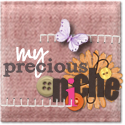Here are some ideas I've gathered that might help us understand our little tots.

If your child isn't even 1, obviously there's not a lot you can do to explain the situation. But if she's past her first birthday, she probably grasps more than you think. "Kids under 2 understand much more than they can say," Korfmacher says. "If you explain that there's a baby in your tummy and that one day it will come out, they get it. You don't have to say or do much more."
Sometime after 18 months, most kids will want to "mother" a doll or stuffed animal. Give your child his own "baby" if he doesn't have one already; this will let your child mimic you when the real baby arrives. Imitation is a toddler's favorite game and can help him absorb what's going on. In addition, you can introduce age-appropriate books about new siblings, even if your child mostly chews them. He may not get the gist of the stories yet, but when the new baby arrives, the scenarios you've been reading about will start to make sense.
Begin transitioning your child into new routines well before her sibling's birth. For instance, I knew I'd want Kate to be with a sitter for a few hours a week, so I started sending her a few months before Sara was born. It helped me get some rest, and it also established a routine for Kate in advance of the baby's arrival, preventing her from seeing the sitter as someone she was stuck with because of her new sister. If you have hand-me-down toys or gear that you're going to give the baby, make sure your firstborn has parted ways with them a few months before the birth.
Overall, the most important thing you can do is reassure your child, says Caroline Clauss-Ehlers, PhD, an assistant professor of counseling psychology in the graduate school of education at Rutgers University in New Brunswick, New Jersey. Certain aspects of pregnancy, such as morning sickness, can be scary to a toddler. I remember once scooping up Kate as I ran to the bathroom to be sick; as I plopped her down and made it to the toilet, she burst into tears. Once I was able, I picked her up and held her close. "Keep letting them know that everything's okay," Clauss-Ehlers says. "They'll understand the emotion." And try not to stress too much about how your child will react to the baby. Children this age quickly forget life without a sibling.
A Firstborn of 2 or 3
Older toddlers and preschoolers have had more experience with babies. They've seen them at the park or have met their friends' little siblings. What will they think about having one of their own? "They'll definitely have an opinion, and they'll definitely share it with you," Clauss-Ehlers says.
Expect your child's feelings to change as she digests the news. For many, anxiety grows as the birth draws near. "It's harder to sit on Mommy's lap, she can't be picked up as easily -- these things can feel disruptive to the child," Korfmacher says. Adds Clauss-Ehlers: "One minute your child might feel upset, then happy -- it's probably going to vacillate."
To that end, choose a variety of sibling books with different tones. For instance, Joanna Cole's I'm a Big Sister and I'm a Big Brother (both HarperCollins) focus on how great it is to be a big sibling, while The New Baby (Random House), a Little Critter book by Mercer Mayer, acknowledges the feelings of ambivalence. You want your child to be excited yet not ashamed of any other feelings he's having, Korfmacher says.
Ages 2 to 3 are when milestones such as toilet training and the big-kid bed occur; make sure your child doesn't feel like he's being made to use the potty or give up his crib when he's not ready. "Don't force those issues or connect them in the child's mind with the baby," Clauss-Ehlers says. Either work on transitions at least three months before you're due or wait until some time afterward. Your newborn can sleep in a bassinet or co-sleeper if you still need the crib for your big kid, and having two in diapers is not as terrible as it sounds.
When the baby arrives, how your child behaves will depend on his personality. Some kids seem uninterested. Others are curious. Play helps them express emotions: some will cradle their dolls, while others will drop them on their head. (That doesn't mean they'll do the same to a real baby. They're just telling you they're not sure they like the idea of a sibling yet!)
Expect some regression from your big kid. He may want to be held more or demand to nurse even though he has long been weaned. He may have accidents even if he's potty trained. Treat regression calmly, without punishment, and praise your child for grown-up behavior. And, of course, sneak in as many extra cuddles as you can to assure him he's still your beloved baby too.
Though your child is anxious about the change in his family, he's excited as well. "Most kids this age take a lot of pride in their new role. Anything you can do to reinforce that will help," says Korfmacher. Hildy Karp, of South Orange, New Jersey, threw a big-brother party for her 3-year-old son, Holden, the day his baby sister came home. "My sisters and Holden decorated our house and got cupcakes, and we all celebrated his new status as a big brother," she says. "A year later, he still talks about it."
A Firstborn of 4 or 5
A child in pre-K or kindergarten comprehends what's going on, and with that understanding can come anxiety. "She might be curious about how giving birth will work physically and therefore be more worried about your aches and pains," says Korfmacher. "Think through how you can best reassure her." For instance, hearing you talk about the baby kicking might set her little brow furrowing; be sure to emphasize that it's normal. Invite her to ask questions. At this age, knowledge is power, so take her to a prenatal visit and consider a sibling-preparation class. My friend Catherine took Ella to see the hospital maternity unit, and Ella got to pass by the nursery and see a newborn. One caveat: Don't discuss the medical aspects of your birth with your child -- the details may needlessly stress her out.
Now that my girls are 4 and 2, they're as thick as thieves most of the time -- and arch enemies the rest. It's a juggling act for me, but watching them learn from each other reminds me that a sibling is the greatest gift I could have given to either one of them.















2 comments:
haaay, im not sure kung ready na si Alex magkaron ng kapatid. eheheh!
hehehe c aj din sis! cousin plang nyo jealous to the max na cya!lol! :)
Post a Comment